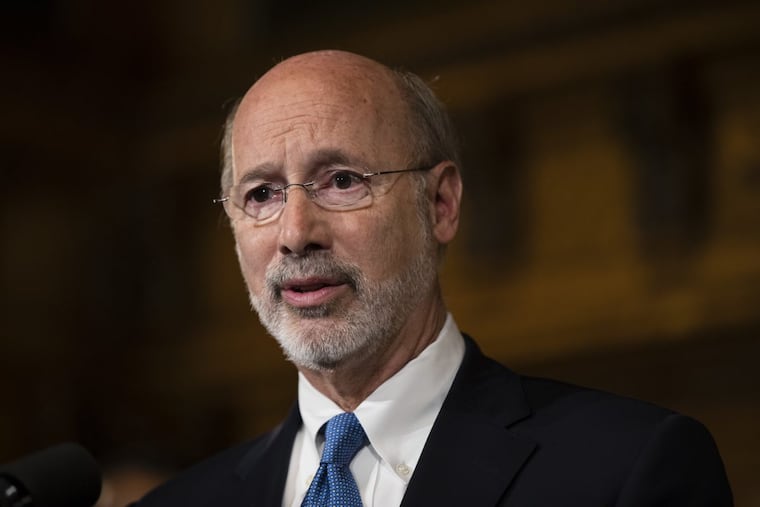With budget impasse, Gov. Wolf delays more than $1B in Medicaid payments
Gov. Wolf forced to cut money out of the budget.

HARRISBURG — With the state's cash running low, Gov. Wolf on Friday said he was forced to withhold nearly $1.2 billion in payments to Medicaid program providers.
In a short statement, the governor said his administration will be unable for at least a week to make the payments to managed care organizations, the private health insurers that cover many of the state's neediest children, elderly, and disabled residents. Insurance industry officials said Wolf's move is unlikely to interrupt services for Medicaid recipients but could affect the business side.
Wolf also said that come next week, his administration will also have to delay a scheduled $581 million payout for the state's share of pension obligations to public school teachers and employees.
It is the second time in the last three years that lawmakers and the governor have headed into the fall without a complete budget in place, forcing tough choices about which bills to pay and where to cut spending. No political solution is in sight to the impasse between the Republican legislature and the Democratic governor, although Wolf is expected to speak with legislative leaders over the weekend to try to jump-start negotiations.
The governor has warned that without a completed budget, other funding may be in jeopardy too, including money for schools and roads.
"There is some real hardship for people and institutions that people in this building really care about, that people of Pennsylvania really care about," Wolf said in an interview this week with the Inquirer and Pittsburgh Post-Gazette, in describing his limited options in managing the impasse.
The announcement comes at a time when the balance in the state's primary bank account is careening toward zero and when the state's budget remains out of balance — making some key state officials hesitant to approve a loan.
Legislators passed a nearly $32 billion spending plan late on June 30, just hours before the start of the new fiscal year. But nearly two-and-a-half months later, they have yet to enact a plan to pay for it. The deficit stands at $2.2 billion.
The House and Senate each passed sharply different revenue bills, by narrow margins. Many expect their leaders to negotiate a compromise that will land somewhere in the middle, but no one has budged — in public, at least.
Wolf has said for weeks that Friday was to be a day of reckoning of sorts, since Medicaid payments to providers were due.
Such payment delays to managed care organizations have occurred in the past, forcing them to borrow money to continue paying doctors and others who care for the low-income residents who qualify for Medicaid.
"It shouldn't impact patients and their access to care, which is the most important part of this issue. It does make the business side of the insurance equation a little messier — but, again, it won't be the first time for that," said Samuel Marshall, president and CEO of the Insurance Federation of Pennsylvania, which represents many health insurers.
Jawanza A. Keita, director of corporate communications for AmeriHealth Caritas, one of the state's managed care organizations, said in a statement that Wolf's decision to delay payments "will not impact our services."
"The health and well-being of our members is our top priority," Keita said.
A spokesperson for Aetna Better Health would not comment, while a spokeswoman for UPMC For You said the organization was reviewing the impact.
The revenue plan passed by the Republican-controlled Senate earlier this summer seeks to balance the budget through a mix of borrowing and new and increased taxes, including a new levy on natural gas drilling. But tax-averse fellow Republicans in the House were opposed to many parts of that.
Earlier this week, the House approved a plan that would balance the budget by borrowing against the state's share of landmark tobacco settlement, expanding gambling, and pulling money from special funds that pay for things such as mass transit, environmental projects, and parks. Democrats have questioned the legality of those transfers.
State treasurer Joe Torsella, a Democrat, had helped the state manage the impasse through a short-term line of credit, but he has said he will not approve further loans without a revenue package in place.
Rep. Stan Saylor (R., York), chairman of the House Appropriations Committee, sent a letter Thursday to Torsella and state Auditor General Eugene DePasquale urging them to help.
He said that cuts to state agencies, schools, health-care providers, or human services would be "extremely harmful." He also noted that the House passed a revenue plan on Wednesday of this week, and that Senate Majority Leader Jake Corman (R., Centre) issued a statement saying his chamber recognized "the urgency of the situation" and promised to "act swiftly to address the needs of the Commonwealth."
The out-of-balance state budget is the subject of a lawsuit filed Thursday by two private citizens and state Rep. Jim Christiana (R., Beaver). They argue that the state's constitution requires a balanced budget and puts the onus for that on both the governor and legislators.
The three are seeking to declare various Democratic leaders' actions unconstitutional, to require the secretary of the budget office to freeze spending "until expenditures balance with available revenues," and to prohibit state officials from borrowing money.
Staff writer Don Sapatkin contributed to this story.